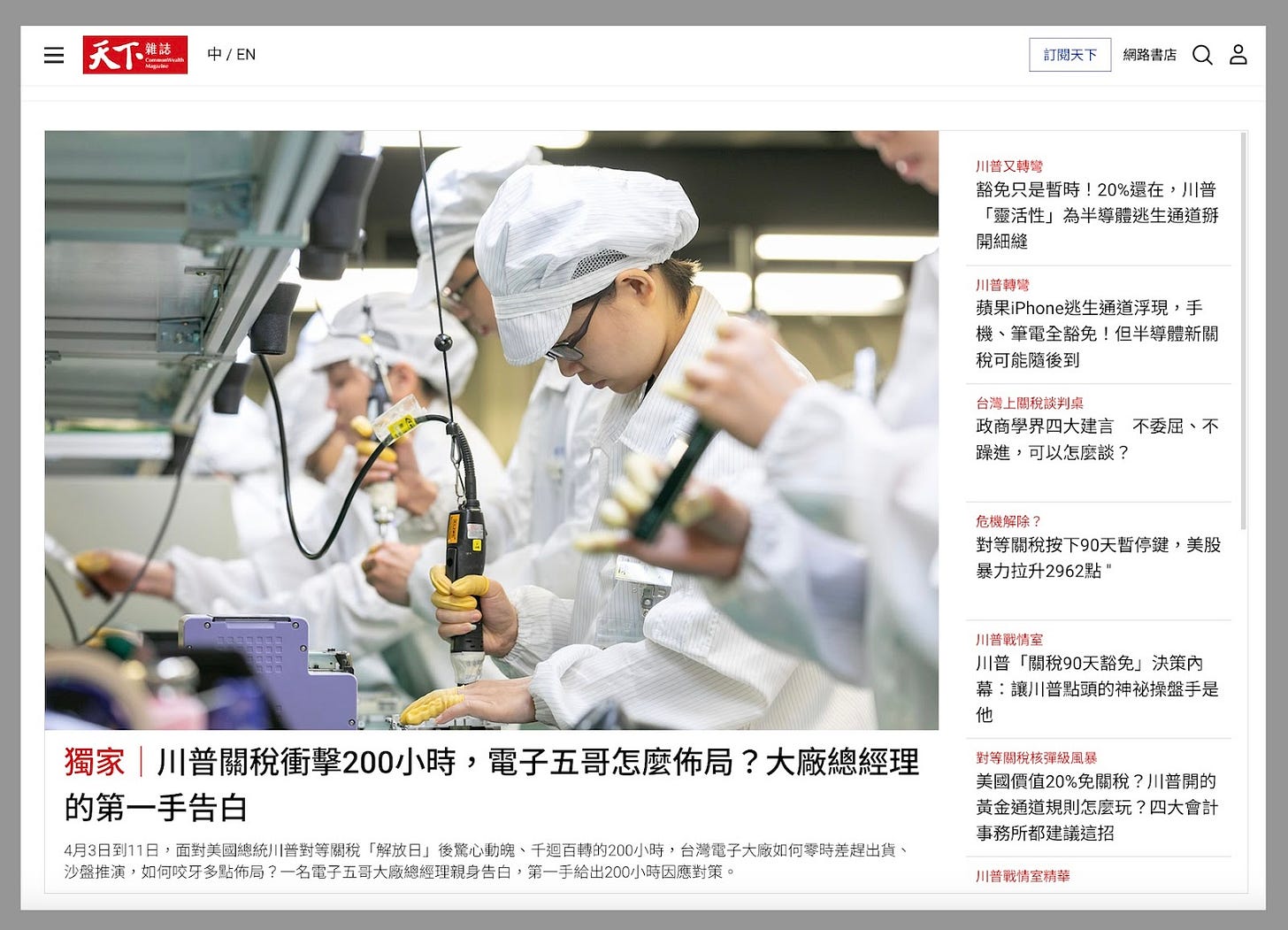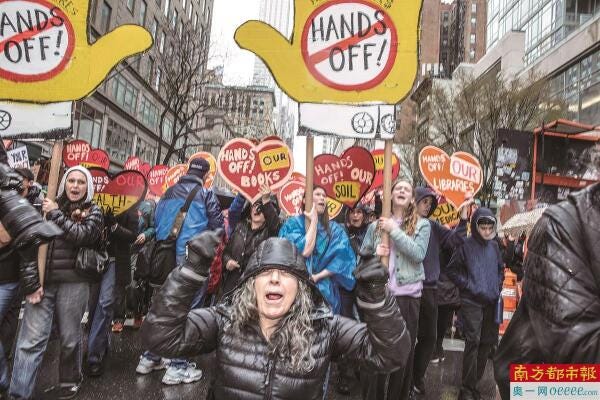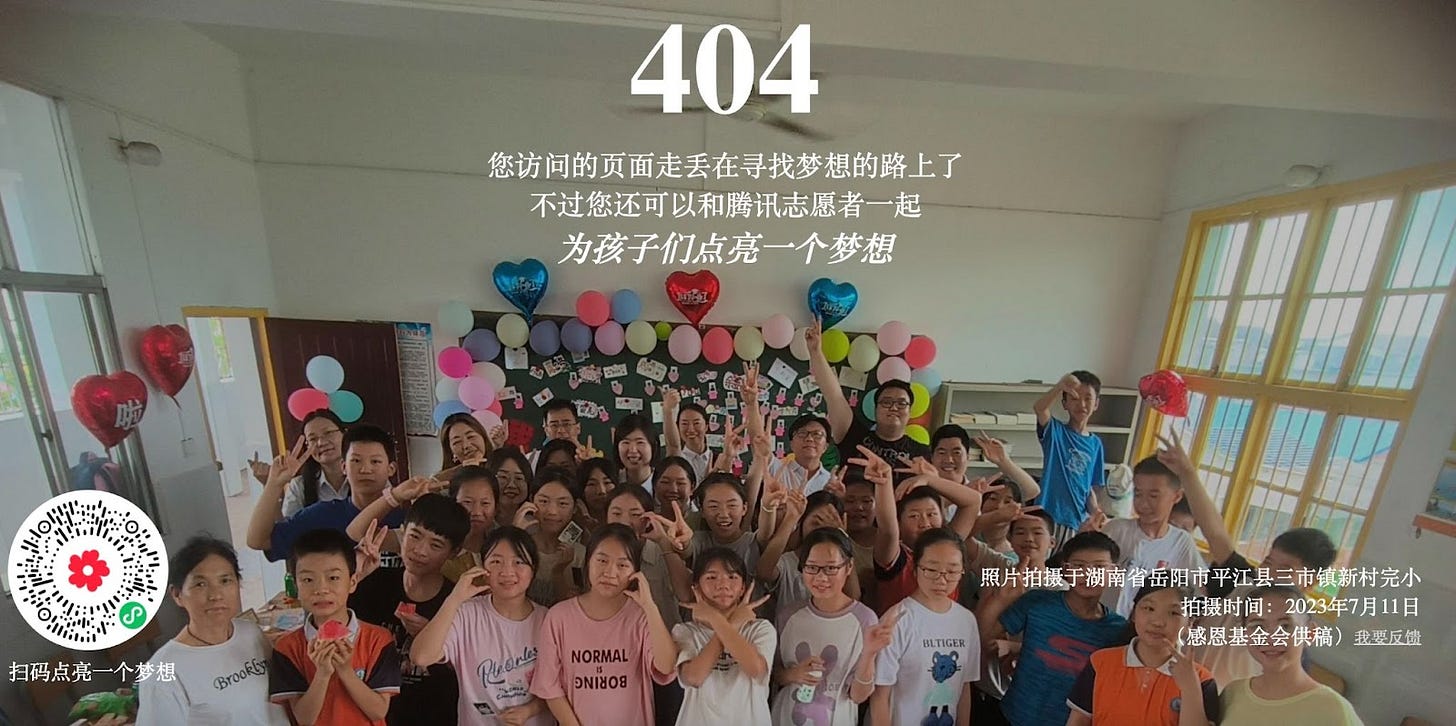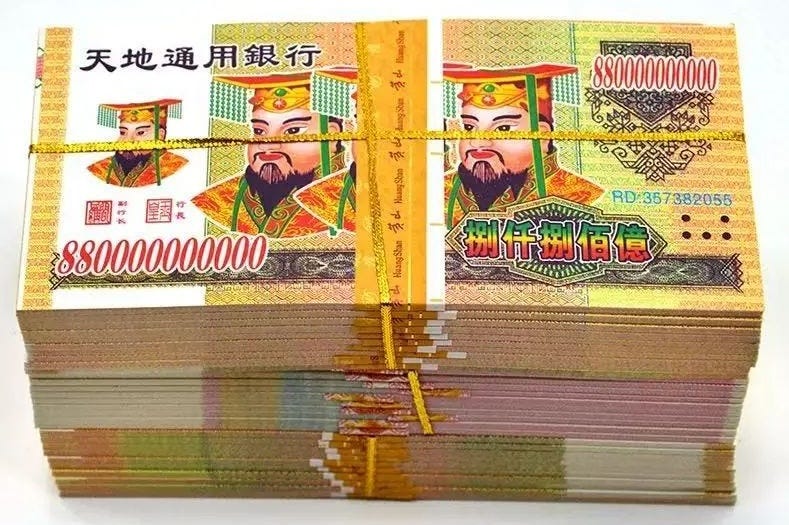Lingua Sinica Newsletter, 17 April
News, analysis, and commentary on Chinese-language media from the PRC and beyond.
Welcome back to Lingua Sinica.
Between cold wars, hot wars, tariff wars and cultural wars, news of conflict can demand a disproportionate amount of our time. So it's a privilege to see you back — and we hope you find something in our latest newsletter to momentarily distract you from the world's troubles (maybe the bit about “fake ghost money” and otherworldly inflation at the end).
We certainly do have a touch of conflict. We look — just a peek, promise — at how China is framing trade tensions this month with the United States (more on that soon); and we address Zelensky's potentially explosive claim that China is "turning a blind eye" to recruitment efforts on Chinese social networks. Those networks, we understand from sources in China, are active and real — a bombshell story just waiting to be covered. But for a touch of nuance, we also discuss and share an hour-long video from former China Central Television (CCTV) celebrity anchor Chai Jing (柴静), now a YouTube influencer based outside China, that shares perspectives from Chinese fighting on both sides of the war.
Don't miss our story, translated from Initium Media, that offers a rather disconcerting look at how far standards have fallen at CCTV and other official television outlets in China since the golden years two decades ago — when Chai Jing and others were able, despite controls, to push the envelope.
Enjoy!
David L. Bandurski
CMP Executive Director
REDLINES
Beijing Bristles
As the US-China trade war deepens, China's messaging is cranking into high gear, with coordination across all media platforms.
Ever since April 2, when President Donald Trump announced the imposition of deep tariffs from White House Rose Garden as a “Liberation Day” for America, China has pushed back hard, framing the United States as bullying, inflexible, and ultimately harmful to the world and itself. The rallying cry from the Ministry of Foreign Affairs (MFA) three days later set the tone of defiance: "The world needs justice, not hegemony!" (世界要公道,不要霸道).
Filtered out through an official notice, or tonggao (通稿), from Xinhua News Agency, the MFA’s language accused the US of “economic bullying” and "zero-sum game playing," and warned that "pressure and threats are not the correct way to deal with China." The message reverberated throughout the media inside China, from the leadership’s People’s Daily (人民日報), to provincial mouthpieces like Guangdong’s Nanfang Daily (南方日報), and on to more commercial outlets like Caixin Media (財新) and the 21st Century Business Herald (21世紀經濟報道). In perhaps the subtlest sign of pique, the professionally-minded Caixin labeled the notice "Authorized by Xinhua for Release" (新华社受权发布). Translation: We were ordered to run this.
For a more detailed look at China’s framing of the US tariffs, stay tuned for our full analysis next week. Until then, here is a breakdown of the key narrative frames driving official coverage over the past two weeks — all evident in the original MFA release.
SPOTLIGHT
Tariff Watch
How will Trump’s actions impact Taiwan?
Taiwan’s CommonWealth (天下) magazine is an indispensable source for business reporting in the country — and now an essential window on how Trump's tariffs are affecting the domestic economy. The magazine’s recent coverage after Trump’s first round of announced tariffs reported that Taiwan faced a steep 32 percent duty — higher than Japan or South Korea — creating immediate strategic dilemmas for manufacturers. The magazine's reporting suggests companies are pursuing two main responses: accelerating investment in US production, or shifting operations to lower-tariff countries. Some English-language articles, like this one, are available on their website. Explore the related articles section at the bottom too.
A Terminal Crisis for Chinese Television
As viewers and revenue vanish, and propaganda pushes aside meaningful content, China's state-run networks resort to everyday corruption to survive.
Initium Media (端傳媒) published an extraordinary inside look earlier this month at the deep challenges facing official Party-run media in China, particularly television networks caught between political control and financial viability — with television audiences left out of the equation. The deeply reported piece reveals how corruption has become normalized as a survival mechanism. China's nearly 2,500 television stations face deep financial pressures, with insiders describing them as "living like beggars” (大家都是过着要饭的日子). At China Central Television (CCTV), reporters' salaries have plummeted while top executives often offer public relations services on the side, and news anchors hawk products via livestreams. Local station reporters earn as little as 800 yuan (110 dollars) monthly, which must be supplemented by commissions from commercial activity.

The core problem is political: increasingly stringent content restrictions have made meaningful programming impossible. As one CCTV producer candidly admitted, everyone knows the solution — allow creative freedom and programs that respond to people's concerns — "but none of these things are possible." The inevitable result, according to a propaganda official, is that "television will gradually die out."
To learn more, read our full translation, or try the original must-read at Initium.
CONTROVERSIES
Citizen Soldier, Citizen Journalist
Independent journalist Chai Jing offers rare insight into Chinese nationals fighting on both sides of the Russia-Ukraine conflict. But there is definitely more to this story.
One week ago, Ukrainian President Volodymyr Zelensky announced that his intelligence services had identified at least 155 Chinese citizens fighting for Russia in Ukraine. "We are collecting information and we believe there are more, many more," he said, adding that the Chinese government appeared to be "turning a blind eye" to recruitment efforts on Chinese social networks. China's Foreign Ministry quickly called Zelensky's claims "groundless," but even this official response was non-existent in media coverage inside China. Meanwhile, the story received strong Chinese-language coverage in overseas outlets including Deutsche Welle, Radio France Internationale, Radio Free Asia and Singapore's Lianhe Zaobao (聯合早報).
But some of the most illuminating coverage had already emerged more than a week earlier — even before Zelensky's public remarks. On March 30, former CCTV celebrity anchor Chai Jing (柴静) released an hour-long video special to her YouTube channel for which she interviewed Chinese fighters on both sides of the conflict. She spoke with "Ma Kalong" (马卡龙), a Russian-allied Chinese soldier, as well as several volunteer combatants fighting for Ukraine, such as Gao Shan (高山) and Peng Chenliang (彭陈亮), who was killed in action.
Chai suggests in her investigation that these fighters are not officially sent by China. However, the video released by Ukraine last week alludes tantalizingly to intermediaries, which points to networks in China that are likely recruiting fighters — a highly sensitive story one Chinese media insider tells us is just waiting to unfold.
According to Chai’s interviews, Russian-allied recruits are primarily motivated by financial incentives, while Ukraine's Chinese volunteers cite ideological commitments to democracy and freedom. This contrast in motivation matches the stark difference in their treatment. While Russian-allied fighters describe poor equipment and conditions, Ukraine's Chinese volunteers (though facing high casualty rates) express a sense of purpose in their choice. Chai Jing’s YouTube channel is chock full of excellent interviews, a welcome comeback from the former state journalist who once roused ordinary Chinese to share images of wasteful government buildings in China by saying: “You are a citizen, and you are a journalist.”
Shop Sign Shenanigans
In the latest kerfuffle over heavy-handed local governance in China, netizens rejoiced this week following news of the removal of the top leader in Hebei’s Sanhe city. His offense? An order issued last week that forced local businesses to replace red, blue, and black shop signs with green ones — at owners' expense. The imperious edict led to a beloved local chain, Mixue Ice Cream and Tea (蜜雪冰城), being forced to swap its iconic red signs for green. Nationwide outrage ensued.
The Sanhe story soared to #2 on Baidu's hot search list and soon state media had pounced. Guangdong’s official Nanfang Daily newspaper ran an expose on the case, and Xinhua News Agency followed with an explainer on how officials had violated the "Eight Point Regulations" — anti-corruption directives issued by Xi in 2012 and recently undergoing another campaign-style resurgence. Not all stories of local delinquency, however, can reach satisfying conclusions by virtue of media and internet exposure. Case in point: a story last week about a Shandong family forced to pay years of morgue fees has vanished completely from the Chinese internet (see (NOT) IN THE NEWS below).
IN THE NEWS
America Unhinged
In a clear double standard, Chinese media extensively covered demonstrations in the US last week against Donald Trump’s policies.
Talk about selective reporting. While protest activity in China remains largely invisible in domestic media, American demonstrations receive front-page treatment. This narrative, emphasizing the apparent disorder of democratic and populist politics in America, is the message that media consumers across China are presumably meant to take away from the wave of protests happening in cities across the country last week.
Chinese coverage of American demonstrations was extensive in its reach, though the official Xinhua News Agency and China Central Television served as the sole sources for most reports, with nearly identical phrasing across outlets. Guangzhou's Southern Metropolis Daily (南方都市報) reported on April 7 that "more than 500,000 people participated in 1,300 protest events across America" against the Trump administration. The article noted that "even 'red counties'” — those generally supportive of Republican Party candidates and policies — had seen sizable protest crowds waving banners with messages like “King of Corruption” and “Make Lying Wrong Again.” The Paper (澎湃), a Shanghai-based online outlet, published an extensive gallery of photos showing demonstrations across major US cities on April 5, describing the events as "the largest collective protest since Trump took office."
While providing comprehensive coverage of American unrest, Chinese media outlets remain silent on domestic protests — even in the once relatively free environment of Hong Kong. The city’s police commissioner, Chow Yat-ming (周一鳴) stressed earlier this month when discussing national security that citizens should consider it their "personal duty" to report violations. The contrast could hardly be clearer. American protests merit detailed coverage, while Chinese ones warrant police scrutiny. If only the Trump administration hadn’t frozen funding for one of the only projects actually monitoring dissent in China.
(NOT) IN THE NEWS
404: What Is It Good For?
A Southern Metropolis Daily report on a family's 380,000 yuan morgue bill went viral, then disappeared — with some creative takes on the nothing-to-see-here message.
An exposé published last week by Guangzhou’s Southern Metropolis Daily (南方都市報) telling the shocking story of exorbitant morgue fees in Jinan, the capital of coastal Shandong province, quickly disappeared from China's internet last week — suggesting authorities were uncomfortable with its implications of bureaucratic negligence. The report detailed how the body of murder victim Liu Yun (刘芸) had remained in storage at a local funeral home for more than five years, accumulating 380,000 yuan (52,800 dollars) in storage fees that the victim’s impoverished rural family could not afford to pay.
The bureaucratic deadlock occurred when police refused to issue a death certificate, claiming the court verdict was sufficient, while the funeral home insisted it needed this specific document to release the body. Despite regulations clearly assigning responsibility to police for issuing death certificates in criminal cases, the impasse continued until media exposure prompted authorities to waive all fees. This is apparently not an isolated case.
As the article vanished online, it left a string of "404" error messages in its wake. In an oddly colorful take on censorship, Tencent turned the page block into a creative error page encouraging users to "light a dream for children" (为孩子们点亮一个梦想) by supporting rural schools. The message poignantly notes: "The page you're looking for has gone astray seeking dreams, but you can still make a difference together with Tencent's volunteers."
SHORT STORIES
| Hong Kong |
A Prize Behind Bars
The Bradley Foundation, a private grantmaking organization in the United States, has awarded imprisoned Hong Kong media mogul Jimmy Lai (黎智英) an honorary Bradley Prize for his defense of freedom, the exile outlet Photon Media (光傳媒) reported last week. Currently in his 1,570th day of detention, Lai faces potential life imprisonment on politically motivated charges. "Even from his small prison cell, my father stands firm against one of the world's most powerful authoritarian regimes," Sebastien Lai (黎崇恩) was quoted by the outlet as saying. "Thank you for reminding everyone this fight isn't over yet." The award ceremony will be held May 29 in Washington.
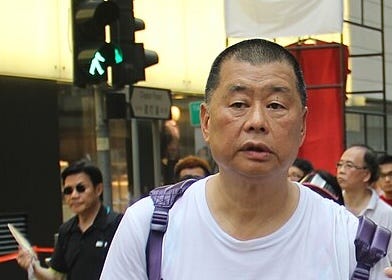
| China |
Dropping the Fig Leaf on Unemployment
China National Nuclear Corporation (CNNC) sparked public outrage after boasting on April 5 of receiving nearly 1.2 million "high-quality resumes" for just 8,000 positions, Hong Kong-based HK01 reported. The state-owned nuclear conglomerate's post — which has since been deleted — included a "starry-eyed" emoji. Critics online called the post, and the emoji in particular, insensitive amid China's severe employment crisis. With approximately 12.22 million university graduates entering the job market this summer, the company’s revelation "ripped off the last fig leaf covering China's dire employment situation," Taiwan's United Daily News (UDN) noted. In a subsequent statement, CNNC pledged to "treat every resume with care," but notably offered no apology.
| Taiwan |
Media Misattribution
German broadcaster Deutsche Welle (德國之聲) found itself in the middle of a hot mess after it was discovered to have used interview clips from the PRC's state-run China Global Television Network (CGTN), the international arm of China Central Television (央視), with no attribution whatsoever. Posted on April 10, the segment featured three Taipei residents expressing pro-unification views. The footage originally appeared on CGTN days before China's recent aggressive military exercises in the Taiwan Strait. The Chinese-language Facebook page Translation Matters (翻譯有要緊) first exposed the issue, prompting Taiwan's Ministry of Foreign Affairs to lodge a formal protest. DW later acknowledged the error, removing the contested footage. "This content was not produced by the Taipei team," it said in its apology.
Scandalous Salute
Leading a recall effort against Democratic Progressive Party (民進黨) lawmaker Lee Kun-cheng (李坤城) on Tuesday, Taiwan politician Sung Chien-liang (宋建樑) sparked outrage by donning a Nazi armband to attend court, the United Daily News (UDN) and other outlets reported. The German Institute Taipei (德國在台協會), Germany’s representative office in Taiwan, condemned Song's "shameless" (無恥) and "deliberate" display of Nazi symbols, calling it a severe affront, according to Taiwan’s state-owned Central News Agency (CNA). Song, reportedly affiliated with the opposition Kuomintang party (國民黨), also performed the Nazi salute while carrying a copy of Hitler's Mein Kampf. Lee criticized the Kuomintang leadership for distancing itself, calling the incident a "serious international scandal" that could damage Taiwan's relations with Israel, Germany and European nations.
Convenience in the Conflict Zone
Taiwan's extensive network of 13,000 convenience stores has emerged as a surprising element in the country's emergency planning against Chinese aggression, following reporting in The Guardian that revealed plans from a cabinet-level committee to transform these ubiquitous retail outlets into wartime community hubs. "We must prepare for the worst scenario," one defense official told the British newspaper. Block Tempo (動區動趨), an online blockchain-based outlet, details how these ubiquitous retailers could distribute emergency rations and medical supplies, and provide Wi-Fi hotspots during a conflict. The pro-China leaning China Times (中國時報) reports that the stores would serve as community support centers where citizens could receive rationed supplies when transportation systems are compromised through the retailers' own logistics networks. Taiwan's Central News Agency (中央通訊社) notes that this idea is among numerous scenarios being considered by President Lai Ching-te's 27-member team, which comprises senior cabinet members, national security ministers, NGO representatives, and figures from the business and religious communities.

ODDS & ENDS
Otherworldly Fraud
When sending cash to ancestors, beware the growing market of unauthorized and potentially hazardous spirit money.
Last week, on the heels of Tomb Sweeping Day, or "Qingming" (清明), across the Chinese-speaking world, the technology media 36Kr reported on a racket that is out of this world. According to the outlet, authorities across the country must regularly crack down on unlicensed "fake ghost money" (假冥币) — the paper bills families burn for the departed.
Though China's Regulations on Funeral and Interment Control focus primarily on cremation policies and facility management, some provincial and city-level regulations have added their own restrictions, including against “feudal superstition.” Liaoning Province, for example, explicitly prohibits the manufacture and sale of paper money and paper replicas — such as gold bars and sports cars — for funeral purposes. Enforcement varies widely by region, but police generally pursue three violations: operations without proper business licenses, products mimicking real Chinese currency, and use of toxic materials. Last year, police in Liaoning shut down an unlicensed workshop producing ghost money from recycled newspapers.
Ethereal levels of inflation are another problem outside the jurisdiction of authorities. These days, ghost bills feature astronomical denominations like 98 trillion yuan — more than two-thirds of China’s total GDP for 2024. In 2018, a lone developer created "Ethereum Ghost Money" (以太冥币) in an effort to "control inflation in the underworld." This digital solution, however, has not yet supplanted traditional practices. For now, the deceased must make do with hyper-inflated spirit currency, proving that questionable monetary policy extends beyond our earthly realm.





